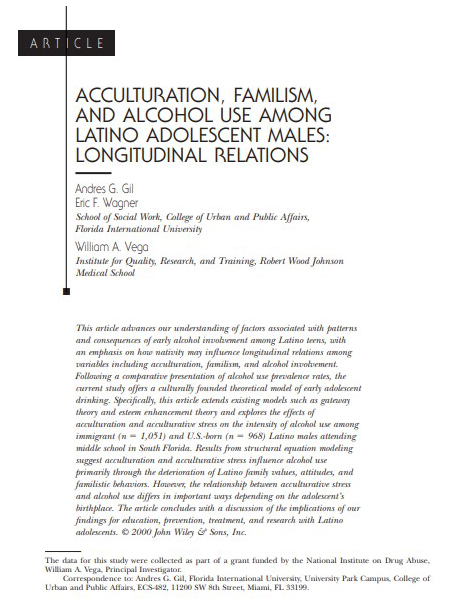Acculturation, familism, and alcohol use among Latino adolescent males: Longitudinal relations
 Abstract: This article advances our understanding of factors associated with patterns and consequences of early alcohol involvement among Latino teens, with an emphasis on how nativity may influence longitudinal relations among variables including acculturation, familism, and alcohol involvement. Following a comparative presentation of alcohol use prevalence rates, the current study offers a culturally founded theoretical model of early adolescent drinking. Specifically, this article extends existing models such as gateway theory and esteem enhancement theory and explores the effects of acculturation and acculturative stress on the intensity of alcohol use among immigrant (n= 1,051) and U.S.-born (n= 968) Latino males attending middle school in South Florida. Results from structural equation modeling suggest acculturation and acculturative stress influence alcohol use primarily through the deterioration of Latino family values, attitudes, and familistic behaviors. However, the relationship between acculturative stress and alcohol use differs in important ways depending on the adolescent’s birthplace. The article concludes with a discussion of the implications of our findings for education, prevention, treatment, and research with Latino adolescents. © 2000 John Wiley & Sons, Inc.
Abstract: This article advances our understanding of factors associated with patterns and consequences of early alcohol involvement among Latino teens, with an emphasis on how nativity may influence longitudinal relations among variables including acculturation, familism, and alcohol involvement. Following a comparative presentation of alcohol use prevalence rates, the current study offers a culturally founded theoretical model of early adolescent drinking. Specifically, this article extends existing models such as gateway theory and esteem enhancement theory and explores the effects of acculturation and acculturative stress on the intensity of alcohol use among immigrant (n= 1,051) and U.S.-born (n= 968) Latino males attending middle school in South Florida. Results from structural equation modeling suggest acculturation and acculturative stress influence alcohol use primarily through the deterioration of Latino family values, attitudes, and familistic behaviors. However, the relationship between acculturative stress and alcohol use differs in important ways depending on the adolescent’s birthplace. The article concludes with a discussion of the implications of our findings for education, prevention, treatment, and research with Latino adolescents. © 2000 John Wiley & Sons, Inc.
Gil, A.G., Wagner, E.F., & Vega, W.A. (2000). Acculturation, familism, and alcohol use among Latino adolescent males: Longitudinal relations. Journal of Community Psychology, 28(4), 443-458. doi:10.1002/1520-6629(200007)28:4<443::AID-JCOP6>3.0.CO;2-A
